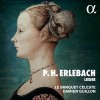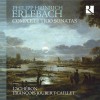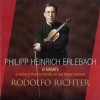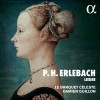传记
Philipp Heinrich Erlebach (25 July 1657 - 17 April 1714) was a German Baroque composer.
Erlebach was born in Esens, the son of Johann Philipp Erlebach, a musician at the court of Count Ulrich II of Ostfriesland (6 July 1605 - 1 November 1648) in East Frisia, the principality where the younger Erlebach received his early musical training.
Based on his musical abilities, Erlebach was loaned out to the court of Prince Albrecht Anton of Schwarzburg-Rudolstadt (born 2 Feb 1641; died 24 June 1710), count of the larger principality of Thuringia, in 1678. In 1681, he was appointed to the post of Choirmaster (Kapellmeister) to the Thuringian Court, a position he held for 33 years, until his death, aged 56, in Rudolstadt (Thuringia).
His compositions include orchestral and chamber music, operas, cantatas, Masses and oratorios.
Erlebach was a prolific composer, but most of his works (over 1000 compositions), which had been acquired by the court from Erlebach's widow after his death, were destroyed in 1735 during a fire in Rudolstadt. This caused Erlebach’s music to be almost completely forgotten. Only 70 compositions (about 7 percent of his working output) survived, some only in handwritten manuscript form, which later had to be transcribed. Much of his posterity is dependent upon published editions of his works.
About 90 of his sacred cantatas still exist, out of a total of more than 400. The destroyed material also included 24 Masses and at least six complete cycles of cantatas for the Lutheran church year. Erlebach also composed secular vocal music and song, included in a 1697 published collection titled "Harmonische Freude musicalischer Freunde",[1] which contains over 75 such pieces. From the more than 120 instrumental works Erlebach is known to have produced, only 13 pieces survive.











